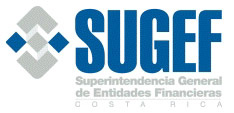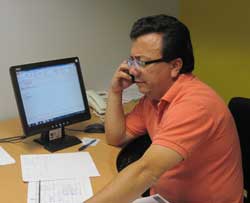Uncategorized
11.75% Colones CDs: Answering Your Questions
 Many people have written to us asking questions about our local investments at Coopenae, so we thought we would follow up and try to answer some of the most common questions. Usually they have to do with why we chose to invest there and whether or not it’s safe. We met with Marco Ramírez Jiménez, the branch manager of our local Coopenae in San Ramon to get accurate information for this article.
Many people have written to us asking questions about our local investments at Coopenae, so we thought we would follow up and try to answer some of the most common questions. Usually they have to do with why we chose to invest there and whether or not it’s safe. We met with Marco Ramírez Jiménez, the branch manager of our local Coopenae in San Ramon to get accurate information for this article.
Our bank, Coopenae, is actually not a bank but more like a credit union. Matter of fact, in their logo it says “Coopenae, La Cooperativa del Sector Educacion.” It started as a credit union for the educational sector and in many ways was a credit union for other, smaller, educational credit unions. In 1994, it opened up to anyone who wanted to join and started offering other services, much like a bank.
Question #1: “Why Coopenae?”
- First of all, it’s growing like crazy, with over 81,000 members
- It’s a non-profit.
- It’s been in business 45 years
- It has 19 branches in Costa Rica and growing
- It is the biggest Cooperativa in Central America and the 4th largest in Latin America
- What struck me most was the low-default rate on loans — less than one half of one percent, the lowest of any financial institution in Costa Rica. They are very careful about to whom they lend money, which accounts for their low default rate. The default rate on national banks is just under 3%.
Question #2: “But how can they pay such high interest rates?”
- Presently, we’re getting 11.75% on a 12 month CD. Also, the account is in colones, not dollars. This is important to consider because of the exchange rate, but since we live in Costa Rica and intend to stay in Costa Rica, most of our expenditures are in colones.
- The average return on CDs at Coopenae is 10-11%, while the average loan they make is at 16%. This may seem high to you, but it’s about 6% lower than the national banks for the same kind of loans. This 5% difference is their “profit” which covers salaries, operating expenses, and expansion.
- Also, in the last year or so, Coopenae received two large loans ($15 million each) at 3-4% interest rates, one from the World Bank, and the other from a Dutch bank. This money was designated for small business loans, not micro-loans. Before the loans, Coopenae was thoroughly scrutinized by the aforementioned institutions.
 In addition, the regulating body of Costa Rica Superintendencia General de Entidades Financieras (SUGEF) monitors ALL 56 financial institutions in the country, has rated them the #1 Coopertiva in Costa Rica. They are also rated highly in the area of liquidity, which means, if you need your money, you can get your money.
In addition, the regulating body of Costa Rica Superintendencia General de Entidades Financieras (SUGEF) monitors ALL 56 financial institutions in the country, has rated them the #1 Coopertiva in Costa Rica. They are also rated highly in the area of liquidity, which means, if you need your money, you can get your money.
Question #3: “What’s the Exchange Rate?”
 Lately the exchange rate hovers around 500 colones to $1
Lately the exchange rate hovers around 500 colones to $1- Jan/Feb of 2008, the exchange rate was 495 colones to $1
- In 2010, the exchange rate was as high as 580 colones to $1
- To check current current exchange rate, visit the website for the Central Bank of Costa Rica
- We do not know what is going to happen with currency values in the future, although due to predictions of a stronger dollar and a weaker Euro, some project that the colon will go to 530 to the dollar – but who knows??
Question #4: “Is my money insured by the FDIC?”
- This is Costa Rica and deposits are not FDIC insured. However, SUGEF regulates all financial institutions here.
- In 2008, the “world financial crisis” started. In the U.S., people lost millions, their homes, IRAs, & pensions. We thought that investing in the U.S. was pretty risky, so why not invest in Costa Rica where we live and intend to live in the future.
Question #5: “Do I have to live in Costa Rica to open a Coopenae account?”
- Unfortunately, to open an account at Coopenae, one must be a legal resident, or at the very least, in the process to obtain legal residency. This is due to new laws that have recently been passed in Costa Rica. For those who are not legal residents and have been living in Costa Rica for more than a year, we are told that it may be possible to be grandfathered in under the old law.
So, is it risky? I don’t know. Is the stock market risky? The U.S. housing markets? How safe are our investments in the U.S., in the richest, most powerful country on earth? With permission of Coopenae, I have put their PowerPoint presentation to Investors below. It is essentially the same presentation I was given 2 years ago, although I didn’t become a client until June 2011. There are 15 slides in total. To move to the next or the previous slide, just click the arrows in the top right-hand corner of the slide.
 If you are interested in more information about Coopenae, your first point of contact is Asdrúbal Zamora Corrales, their English-speaking financial advisor, at [email protected] or call 011-506-2257-9060, ext. 3721.
If you are interested in more information about Coopenae, your first point of contact is Asdrúbal Zamora Corrales, their English-speaking financial advisor, at [email protected] or call 011-506-2257-9060, ext. 3721.
To read our original article about Coopenae, click here: https://retireforlessincostarica.com/2011/07/investing-in-colones-certificates-of-deposit/
Disclaimer: The articles on this website are intended to provide general information only and have been prepared by RetireforLessinCostaRica.com without taking into account any particular person’s objectives, financial situation, needs or preferences. Our readers should, before acting on this information, consider the appropriateness of this information regarding their personal objectives, financial situation or needs. We recommend investors obtain financial, investment, or legal advice specific to their situation before making any financial investment or relocation decision.
